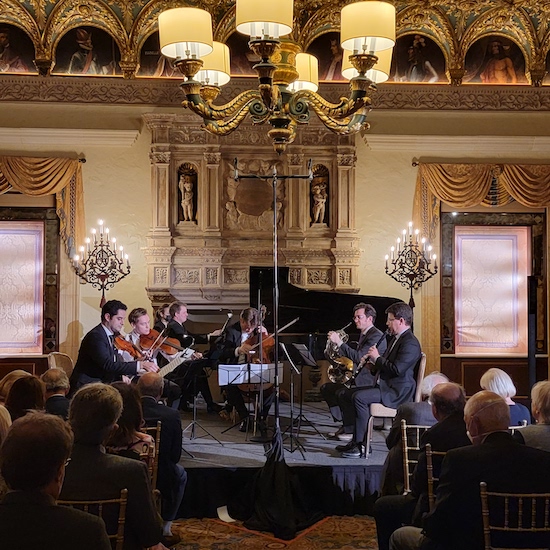Chamber Music Society of Palm Beach opens with impassioned program

The exceptional season-opening concert of the Chamber Music Society of Palm Beach featured a composer with a strong and surprising Florida connection.
The Hungarian composer Ernst von Dohnányi studied in Budapest, won the favor of Brahms, and capped his long European career with ten years on the faculty of Florida State University. His grave lies in Tallahassee, and an FSU recital hall still bears his name.
Dohnányi’s 1935 Sextet in C Major for piano, clarinet, horn and strings is a terrific work, grandly conceived, with big melodies, lots of drama and an engaging sense of humor. The work received a committed, sonorous performance before a sold-out crowd Monday at the Breakers Palm Beach hotel, in an ornate room lined with paintings of explorers and conquistadores.
Also on the program was the better-known Brahms Horn Trio, which received an equally compelling performance. The chamber music society’s leadership deserves credit for assembling top-flight performers in such an unusual combination of instruments, allowing their audience to experience high-quality performances of these works.
With its rich combination of instruments and the surging, impassioned playing of the musicians, the opening Allegro of Dohnányi’s Sextet sounded at times like a symphony or a piano concerto. The musicians hit hard on the razor-sharp two-note interval that dominates the movement, giving energetic force to the movement’s angular melodies and murky harmonies.
In the Intermezzo, pianist Andrew Armstrong skillfully built a rhythmic figure through a big crescendo, as the movement expanded into a fortissimo statement by all the musicians. Clarinetist Alex Fiterstein played his long opening solo with a full tone and lots of personality. The rapport was apparent among violinist Arnaud Sussmann, violist Matthew Lipman and cellist Edward Arron as they played an emotional, even schmaltzy, melody, pouring on apt and ample vibrato.
The Finale opened with a lively, impish theme. A sentimental melody tried to rise in the strings, then got repeatedly bumped out of the way by the mischievous main theme—a mini-drama the musicians brought off with skill and wit. The theme finally soars, with singing, evocative playing in clarinet and horn.
The forces may have been smaller for the Brahms Horn Trio, but the performance was similarly big in scale in music that ranged from rustic hunt motifs to bleak tragedy.
Sussmann’s tone on the violin was strikingly rich, easily able to hold its own against the horn and piano. Kevin Rivard brought a rounded tone and smooth phrasing to the horn music that gives the work its unique color. Armstrong gave rumbling, understated power to the piano part. Their playing was warm and committed throughout, with particular force in the plangent phrase that climaxes with a pained, dissonant chord.
It was hard to keep still during the rollicking Scherzo, so bouncy and propulsive was their playing. Rivard’s horn playing again was impressive, as he calibrated his tone to seize the melody or add color to the tunes in the violin and piano.
The Adagio swirled with passion and melancholy, with frantic piano playing and edgy intensity in violin and horn. With Sussmann’s violin soaring in the main theme, it was hard to imagine the music being played with greater fervor and tonal warmth. The musicians concluded the Trio with a vigorous account of the hunt-themed finale.
The seven-concert season of the Chamber Music Society of Palm Beach runs through April, with events at the Breakers, Norton Museum and Trinity Church. The next concert features violinist James Ehnes and pianist Inon Barnatan, and will take place December 22 at the Norton Museum in West Palm Beach. cmspb.org
Posted in Performances
Leave a Comment
Tue Nov 16, 2021
at 10:24 am
No Comments